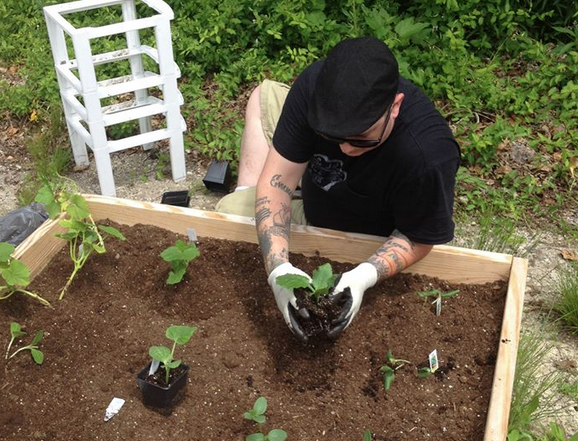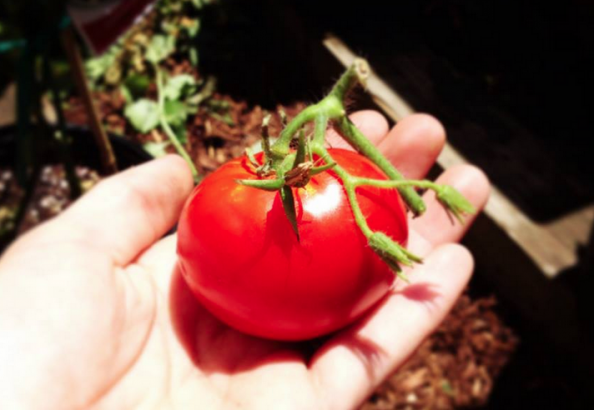By: Christine Sykes Lowe,
Farmer and Chef South Managing Partner
You have probably heard of the term “guerrilla” applied to various tactics before, such as Guerrilla Marketing. A splash of a logo artfully emblazoned on the side of a building or street pavement, a double utilization of redundantly bland outside space and a consumer brand image getting in front of the sometimes elusive and constantly distracted public eye.
Guerrilla Gardening, is just about that type of unexpected if not slightly irreverent action, but also about production of something alive and growing. It can be for consumption or simple, visual beauty. A neglected piece of land overgrown with weeds can be transformed into something useful- even, at the risk of admittingly sounding a bit corny...majestic. But in reality,what people are creating across the world on large and even much smaller scale, can be nothing short of breathtaking. We have one of those pioneers right here in Asheville.
Steven Goff (pictured above with wife Sam), Owner and Chef of
King James Public House on Charlotte Street delves into this past time and sheds some light on why he does what he does, from sustainability beliefs to fermentation techniques and beyond.
Christine Sykes Lowe: “Guerrilla Gardening”, the name just implies delicious irreverence, what does it mean to you and how did you get started?
Steven Goff: Guerrilla gardening is just another way to combat the wastefulness that goes on in our society far too often. I do a lot of the things I do in the name of sustainability, I use every bit of every vegetable, core and all, because its wasteful not to, and on top of that its tasty and nutritious to eat. You just have to prepare it a little differently. For instance cabbage cores and broccoli stems could be shaved on the mandolina and then pickled, fermented, sauteed, even eaten raw in a salad. I guerrilla garden because that land/space is sitting there being wasted, why not grow food on it? Is it legal? Not necessarily. But, I can't stand to see things wasted whether its food, time, notions, or space. I spent a good bit of time living on the streets so wastefulness never has and never will go unnoticed by me. Not only that, but there is no better feeling than watching something go from seed to plate. I didn’t just make that dish, I just made that vegetable!
CSL: It also seems to be a solution to food desert issues, where things at least have the ability to thrive- do you agree?
 SG:
SG: I'm pretty sure guerrilla gardening came about because of food desert issues, not only does it provide both food and community to local residents, it also beautifies the area. I heard about this years ago and just never had the right opportunity until recently. I would love to do something like it with Bountiful Cities or some other non profit. One thing I really want do is find a space downtown or close to, and build a giant community/guerrilla garden and use the produce and everything it provides to feed the homeless once a week or more...
CSL: That would be quite an undertaking. I personally would love to see something like that. Are there known examples on a larger scale in other parts of the country?
SG: I'm sure somebody is doing it on a larger scale somewhere in the US, but right now it is huge in Europe and Australia. I think its a really positive thing that could be very helpful in large urban area, or even in some poor rural areas. I’ve heard of chefs doing it in NYC in whatever nooks, crannies, roofs and alleyways they could find. I thought if they can do it I can surely find a spot in Asheville!
CSL: Do you use the harvest at King James? What other foraging do you bring in?
SG: We do use the harvest at King James, right now all we have gotten is squash blossoms, and a few peppers here and there- but I was also a little late in planting.
Also I had not anticipated nature being harvest competition as there is a ground hog hijacking all my shoots and veggies before I can get to them. We utilize a ton of foraged items at King James as well, such as daylillies, mulberries, strawberries, blueberries, blackberries, pea flowers, honeysuckle, birch twigs, lemon balm, chickweed, green garlic, nettles, sunflowers, mushrooms, pine, purslane...the list goes on.
CSL: Sounds delicious, it's amazing what you can find literally "growing around". So, lastly, tell me about your fermentation practices and the some the unique combinations you "brew" up....
SG: We use a lot of different fermentation techniques, right now we are developing our HACCP (Hazard and Critical Control Points) plan to obtain a variance so we can use these products. An interesting one we like is the japanese nuka pot, they use ground rice bran to bury their veggies in to ferment. We have one of those that we do use sometimes but I wanted something more representative of WNC, so I thought about it and why not use spent grain from the local breweries, it already has good active culture in it! We do spent grain pickles by burying them in the grain mixed with a little salt and beer and you get the coolest crunchiest veggie pickle.
The reason I started fermenting in the first place was to really taste the area. For example, in San Francisco, their sourdough has a distinct, pronounced flavor that cant be replicated, there is no same area or terroir, if fermented things have terroir, which they definitely do, the terroir is so pronounced that if I ferment something at my house and you ferment something at yours they will taste different, each one will fully represent its precise location on a map! There's multiple other fermentation techniques we have used, everything from wet brine to miso bed, to the old bruise and press. Either way they are all tasty so come by King James Public House and get a taste of Asheville.
www.farmerandchefsouth.com
